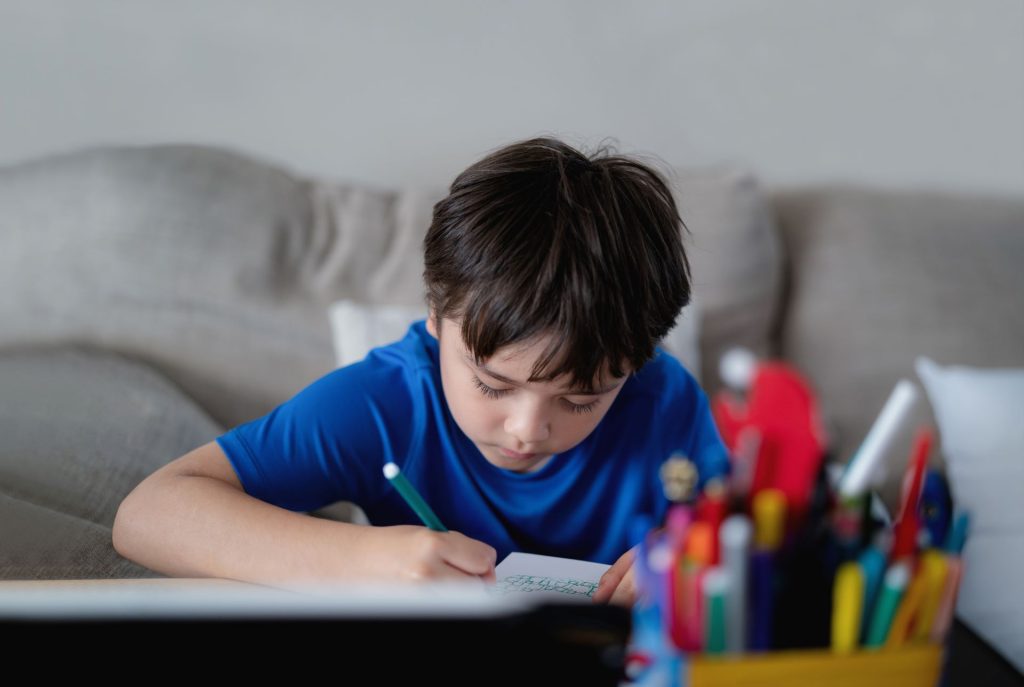
Supporting Children with Dyslexia
Is your child struggling with reading, writing, spelling, or comprehension? Do they have difficulties remembering things or short-term memory difficulties?
These difficulties are commonly associated with Dyslexia in children.
Dyslexia can create challenges in reading, such as a slow reading pace, limited
comprehension, or mispronunciations. Writing can be difficult, making expressing ideas and identifying mistakes hard. Messy handwriting is also common. Some children may also have coordination issues or confuse their left and right.
Dyslexia and associated learning difficulties can significantly impact a child’s life, affecting their ability to learn and thrive in various environments.
We are here to help
We’re here to help you navigate these challenges and support your child’s development.
The Cluas Programme is specially designed to provide personalised support and an evidence-based approach to support children with dyslexia.

Meet Noah
Noah’s parents became concerned when his teacher mentioned that he was having difficulties with reading and writing. His teacher said he often mixed up letters, writing a “d” when it should be a “b.” Although Noah has learned to read, he does not understand what he is reading. His reading age was below that of his peers.
Introduction
He often appears to lose attention and cannot concentrate on his teacher’s words. His teacher said that she often finds Noah in a daydream, especially when the class is getting giddy or other children are talking, during art, for example.
At home, Noah needs help following his parents’ instructions. He is liable to follow the first or last part of instruction but never the complete instruction.
Noah also often mispronounces words, and his older brother gets frustrated with him when he can’t understand what Michael is trying to say. His mother has often thought that it is as if Michael does not hear the words correctly.
His few friends describe him as being shy, but the reality is that Noah does not say a lot because he is not sure what they are talking about. He can’t work it out quickly enough.
Noah’s parents brought him to Cluas to investigate whether it might be a good option for him . The results of these tests and anecdotal information from discussions with his parents showed that Michael has Listening difficulties and does not process sound or Auditory information in the same way as others. Despite having perfect hearing, Michael does not process auditory information (what is said to him) like his brother.
Noah’s parents indicated that he had persistent ear infections or Otitis Media. These ear infections have contributed to his listening and processing Difficulties, as during the early stages of development, Michael was processing auditory information through the “filter” of the ear infection. It is also possible that the ear infections impeded the development of his Auditory Processing abilities.
Discovering Cluas
Noah’s parents decided that a Cluas Listening Programme would be beneficial in helping him to develop his Processing Abilities. The Cluas Programme retrained his ear so that it could first receive auditory information correctly and, secondly, it could be processed more efficiently.
The Cluas Listening Programmes use specialised sound equipment and classical music. We tailored Noah’s programme to address his specific difficulties. This retrained his ability to analyse sounds and his listening and auditory processing abilities.
Noah completed his Cluas Programme six months ago, and now his Mother reports that he is more interested in reading, it is no longer a chore, and that he has taken up his book spontaneously to read, which never happened before. She also reports that his concentration is better, and he is more ‘with it.’ He can follow the teacher’s instructions and come home with the correct homework. At times, Michael can still reverse words and letters; however, he does it less frequently now.
-

Conor, age 8 –ADHD, Dyspraxia and Dyslexia
“… From the minute Conor came in to the world he was challenging. He never slept, he had colic, he ‘head banged’ along with numerous other difficulties…Today I have a very happy teenager … family and friends cannot believe the difference…”
Frequently Asked Questions
Specific programmes for your child
At the core of the Cluas programme is a unique system of sound stimulation. Our programme uses music to retrain and improve your child’s auditory processing skills. We use specialised sound equipment, to retrain the way the children gather and process information
What is the Cluas Programme?
What is the Cluas Programme …
Is each programme individualised?
What is the Cluas Programme …
The difference between hearing and listening?
What is the Cluas Programme …
Where is the Programme delivered?
What is the Cluas Programme …
The Cluas Programme for Children
How can Cluas help?
If your child is facing dyslexia, you don’t have to navigate the journey alone. We’re here to help.
Together, we can unlock your child’s full potential, build essential skills, and create a brighter future.
Take the first step & contact us today
